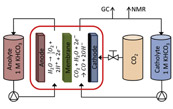Publication
911
Curr. Opin. Electrochem., 24, 49-55, 2020
DOI:10.1016/j.coelec.2020.07.001
|
|
|
|
|
|

|
Emergence of CO2 electrolyzers including supported molecular catalysts |
|
|
|
Kristian Torbensen, Benjamin Boudy, Dorian Joulié, Niklas von Wolff, and Marc Robert
Université de Paris, Laboratoire d’Electrochimie Moléculaire LEM, CNRS, F-75013 Paris, France
Institut Universitaire de France (IUF), F-75005 Paris, France
With access to cheap, sustainable electricity, electrocatalysis is a promising technology for converting electric power into storable chemical fuels or value-added chemical compounds. This has sparked the development of electrocatalysts that need to operate at high product selectivity and high energy efficiency. Electrocatalytic alcohol oxidation, oxygen activation and nitrogen and carbon dioxide (CO2) reduction are examples of reactions with a huge industrial potential. Notably, electrocatalytic reduction of CO2 has recently developed as a favourable pathway to convert this greenhouse gas into value-added chemicals and fuels. Earth-abundant metals stabilized by carbon/nitrogen macrocycle ligands are well-known efficient and selective catalysts for the electrochemical reduction of CO2 in homogeneous conditions. Recently, such catalysts have also been used in supported conditions and implemented in flow cell electrolyzers, showing promising performances. This review provides a synopsis for the evolution of CO2 electrolyzers using molecular catalysts. |

